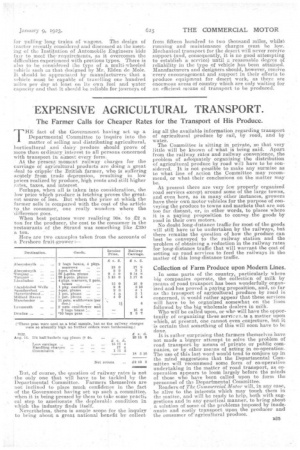EXPENSIVE AGRICULTURAL TRANSPORT.
Page 11

If you've noticed an error in this article please click here to report it so we can fix it.
The Farmer Calls for Cheaper Rates for the Transport of His Produce.
THE fact of the Government haying set up a Departmental. Committee to inquire into the -matter of selling and distributing agricultural, horticultural and dairy produce should prove of more than ordinary. interest to all persons concerned with transport in ahnost every form.
At the present; moment railway charges for the carriage of agricultural products are doing a great -deal to cripple' the British farmer, who is suffering acutely from trade depression, resulting in low prices realized by produce, high rents and still higher rates, taxes, and interest. .
. Perhaps, when all is taken into consideration, the low price which produce is fetching proves the greatest source or foss. But when the price at which the farmer sells is compared with the cost of the article to the consumer, one really wonders where the -di fierence goes. .
When best potatoes were realizing 30s. to a a ton for the producer, the cost to the consumer in the restaurants of the Strand was something like 2350 a ton.
Here are two examples taken from the accounts of a Pershore fruit-grower :—
But, of course, the question of railway rates is not -the only one that will have to be tackled by the Departmental Committee. Farmers themselves are not inclined to place much confidence in the fact of the Government having set up such a committee, when it is being pressed by them to take some practii cal step to ameliorate the deplorable condition in which the industry finds itself.
Nevertheless, there is ample scope for the inquiry to bring about a great national benefit by collect ing all the available information regarding transport of agricultural produce by rail, by road, and by water.
The Committee is sitting in private, so that very little Will be known of what is being said. Apart from the railway rates and railway convenience, the problem of adequately organizing the distribution of agricultural produce by road will have to be considered. It is not possible to make any Surmise as to what line of action the Committee may recommend, or what their conclusions on the matter may be.
At present there are very few properly organized road services except around some of the large towns, and even here, as in many other instances, growers have their own motor vehicles for the purpose of conveying the produce to towns and markets that are not too far distant, or, in other words, to places where it is a paying proposition to convey the goods by road in their own motors.
No doubt long-distance traffic for most of the goods will still have to be undertaken by the railways, but there remains the question of how the produce can best be conveyed to the railway station and the problem of obtaining a reduction in the railway rates for long-distance traffic that will warrant the cost of setting up road services to feed the railways in the matter of this long-distance traffic.
Collection of Farm Produce upon Modern Lines.
In some parts of the country, particularly where big companies operate, the collection of milk by means of road transport has been wonderfully organized and has proved a paying proposition, and, so far as the transport of agricultural produce by road is concerned, it would rather appear that these services will have to be organized somewhat on the lines followed by the big wholesale dealers in milk, Who will be called upon, or who will have the oppor
tunity of organizing these services, is a matter upon which, at present, one cannot even conjecture, but it .is certain that something of this will soon have to be done,
It is rather surprising that farmers themselves have not made a bigger attempt to solve the problem of road tranvort by means of private or public companies, or by other means of acting in co-operation. The use of this last word would tend to conjure up in the mind suggestions that the Departmental Committee will recommend some form of co-operative undertaking in the matter of road transport, as cooperation appears to loom largely before the minds of those who have been called upon to form the personnel of the Departmental Committee: Readers of The Commercial -Motor will, in any case, be alive to the interests which may touch them in the matter, and will be ready to help, both with suggestions and in any practical manner, to bring about a solution of some of the problems imposed by inadequate and costly transport upon the producer and the consumer or agricultural produce.
































